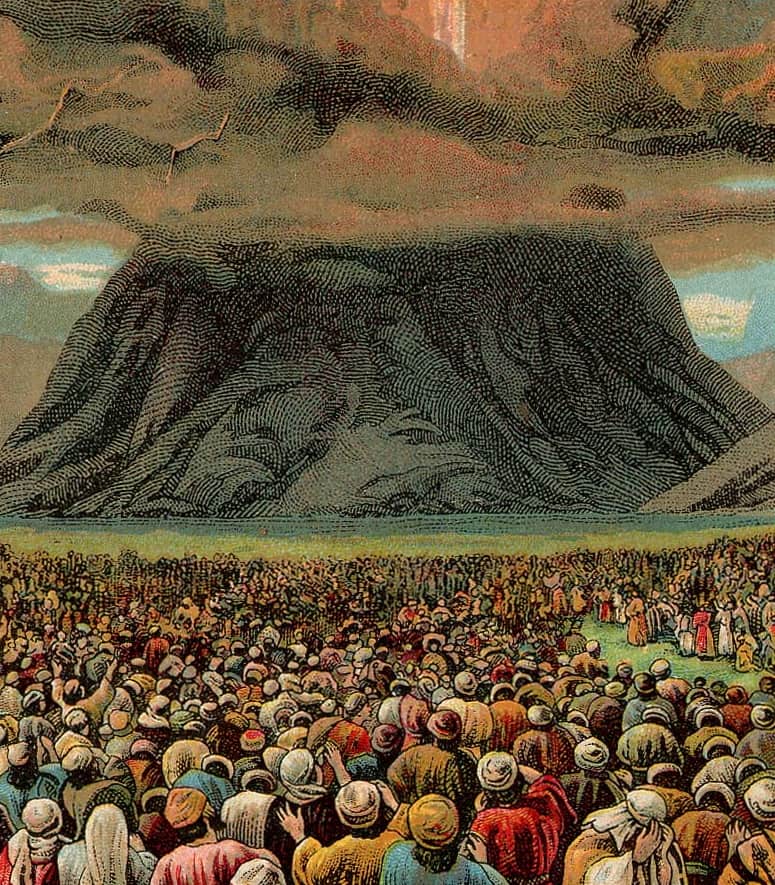1 And God spake all these words, saying,…
12 Honour thy father and thy mother: that thy days may be long upon the land which the Lord thy God giveth thee.
— Exodus 20:1,12 (KJV)
What is the meaning of “Honor your father and your mother.”
To understand what does the fifth commandment mean, compare it to how the Bible describes what our relationship should be with God our Father. Honor our parents in a similar way that you want to bring glory to God; in our thoughts, words, and actions. As God the Father is our ultimate creator, we should also honor our mortal parents.
Jesus responds to the Pharisees:
3 But he answered and said unto them, Why do ye also transgress the commandment of God by your tradition?
4 For God commanded, saying, Honour thy father and mother: and, He that curseth father or mother, let him die the death.
5 But ye say, Whosoever shall say to his father or his mother, It is a gift, by whatsoever thou mightest be profited by me;
6 And honour not his father or his mother, he shall be free. Thus have ye made the commandment of God of none effect by your tradition.
What does honor your parents mean specifically?
- Follow God’s commandments and laws to honor your mother and father as a child of God, being good fruit on their vine.
- Be grateful and appreciate all your mother and father have done for you. Value their guidance.
- Accept the authority of your mother and father, especially when you are young, and recognize the authority God has given to them.
- Treat them with respect in your thoughts, words, and actions. This includes what you say and how you say it and what you do. Even if some parents at times act in ways that make it hard to respect them. Even then, honor your parents by not using disrespectful speech and actions.
- Provide for your mother and father when they get old or need support. Do your best to make sure that they have what they need.

What does the 5th commandment not mean?
- Misinterpretation: You must let your mother and father control your actions, as well as other elders in your family (like grandparents, aunts, uncles), due to their authority.
Truth: The Bible says that marriage takes priority over other family relationships and that a couple can righteously decide to set boundaries limiting the involvement of relatives in their marriage. And the goal isn’t to control children, but to teach, lead, and support their children. - Misinterpretation: Total authority was given to your father and mother. You have to do whatever they say, no matter what.
Truth: God did give parents authority within the family, however, all human authority has limits—it never overrules God’s ultimate authority. - Misinterpretation: You must follow your father and mother’s religious beliefs.
Truth: The Bible encourages us to test what we are being taught to see whether it is the truth. The Bible mentions a number of faithful servants of God who did not follow the religion of their parents, including Abraham, Ruth, and the apostle Paul. - Misinterpretation: To honor your father and mother, you must honor your ancestors.
Truth: God alone you must worship. A person who becomes fixated on honoring their ancestors can easily turn into ancestral worship. Which is displeasing to God. Moreover, the Bible teaches that “the dead know nothing at all.” They are not aware of any homage rendered to them; neither can they help or harm the living.
Should you still honor your parents even if they are not “righteous” or not part of the church?
This is what Jesus says:
34 Think not that I am come to send peace on earth: I came not to send peace, but a sword.
35 For I am come to set a man at variance against his father, and the daughter against her mother, and the daughter in law against her mother in law.
36 And a man’s foes shall be they of his own household.
37 He that loveth father or mother more than me is not worthy of me: and he that loveth son or daughter more than me is not worthy of me.
38 And he that taketh not his cross, and followeth after me, is not worthy of me.
39 He that findeth his life shall lose it: and he that loseth his life for my sake shall find it.
So what does the 5th commandment mean in context with the whole Bible?

We should honor our mother and father, but we should love God the Father and Jesus first. Should a conflict arise between what God’s word says and them, we should follow God and Jesus first over our mortal parents.
Matthew 18:17 and other verses discuss how you should talk to members of God’s church who do wrong, which can include your parents if they are part of the church. It should be done with encouragement and multiple warnings.
If they are not part of God’s church or a believer, then even as an enemy of you, the church, and God, they should be treated with honor, respect, and love. You should warn them respectfully with love that they do wicked (Ezekiel 3:18) and tell them about God and the gospel (several verses tell us clearly that God expects us to spread His Word).
If they refuse to listen, you must separate yourself from them. Even then it should be done with honor, respect, and love. You should still honor and provide for them with love. You should still be respectful to them despite what they might have done.
Where did the Fifth Commandment come from?

After God (using Moses) liberated His people from slavery in Egypt, God instructed them on how to live as a society under His rule. God, in a thick cloud from the top of Mount Sinai, spoke as a loud trumpet His laws so that Israelite people would know how to not sin, how to love God, and love their neighbors as themselves (Matthew 22:37-40). These laws are called the ten commandments or the law of liberty (liberty from sin). Learn more about the Ten Commandments.
Related Questions:
- How does a child dishonor their parents?
- How does a child honor their parents?
- Does God remember the sins of the father on their children?
- Do Christians have to listen to their parents always?
- Should children disobey their parents to obey God?
- Do children have to obey all of their family elders?
- What does the Bible say about a child who disobeys their parent?
- What does the Bible say about raising a child?
- What does the Bible say about being a child of God?
- What does the Bible say about punishing a child?
Our Adventist Life is a dedicated online evangelist and mother of two, deeply rooted in her Seventh-day Adventist faith. With over 15 years of experience in creating and optimizing digital content, she brings a unique blend of professional expertise and spiritual insight to her work. Her passion lies in exploring Biblical truths and their practical applications in daily living, self-care, and family nurturing. Through her writing, she aims to inspire and guide her readers toward a more fulfilling Christian lifestyle, drawing from her own experiences as a parent and a follower of Christ. Her thoughtful and engaging content reflects her commitment to sharing the love and wisdom found in the Scriptures with a modern audience living in the end times.




Leave a Reply